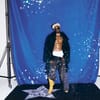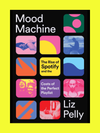Danny Brown, Back for the First Time
The audacious rap veteran on sobriety, platforming trans artists, and working with the next generation of hyperpop stars on his latest album, ‘Stardust.’

Danny Brown has made a habit of not fitting in. Even though he came up worshipping hip-hop traditionalists like Nas, he’s always preferred to hook his skills onto music scenes and sounds most rappers of his era wouldn’t touch with a 10-foot pole. Ever since he first broke out 15 years ago, his embrace of EDM, psych rock, and internet-adjacent scenes like digicore has cemented his place as one of independent rap’s most adventurous stars.
It wasn’t always easy on Brown, though. “I would drift off and make some electronic shit, but then the hip-hop heads would be like, Oh, this nigga’s on some skinny- jeans bullshit again,” he says over the phone. “And because I’m so deep into the rap shit, I feel like I was never fully accepted into those other worlds.”
Stardust, his seventh album and best since 2016’s Atrocity Exhibition, finds the 44-year-old at a different precipice. Once known to jump between gleeful hedonism and nihilistic self-destruction, he’s now two years sober, levelheaded, and settled down in Texas. Stardust is the first album he’s ever recorded drug-free, and there are noticeably fewer songs about dying like a rockstar or numbing trauma with endless seas of drugs and sex. “I had to fall in love with music again,” he says, likening the Stardust’s writing and recording process to re-learning how to ride a bike or flex a muscle.
When he would get brief access to his phone while in rehab a couple of years ago, the two artists he was usually listening to were underground Gen Z idols Underscores and Jane Remover. Both are heavily associated with hyperpop, the oft-misunderstood subgenre that sits at the constantly mutating intersection where EDM, hip-hop, post-punk, and lowbrow internet references collide. Once Brown was back outside, he did what he always does: fan out and make connections with an exciting new generation of artists. Stardust features some of the biggest names in hyperpop, including Jane and Underscores as well as rising stars like Quadeca, Nnamdi, and Johnnascus. Angel Phrost, one-half of the pop duo Frost Children, reads poetry across a handful of tracks, acting as a narrator to a loose narrative Brown compares to Prince’s Purple Rain.
But for all the jumps between new-age glitchiness and old-school electronica, Brown is still here to rap. He soars across these screaming beats, his elastic delivery matching each and every wild beat switch. In many ways, Stardust scans as a mature remix of 2013’s Old, which also had him zipping across avant-garde digital soundscapes. He’s still capable of hitting frenetic highs and depressing lows, but he’s no longer spiraling through them. When so many other rappers his age are going through the motions or wallowing in nostalgia, Brown feels like he’s finally found his true self.
Get access to everything we do at Hearing Things—including weekly album and song recommendations along with our ever-growing archive of interviews and reports—with a free 30-day trial!






